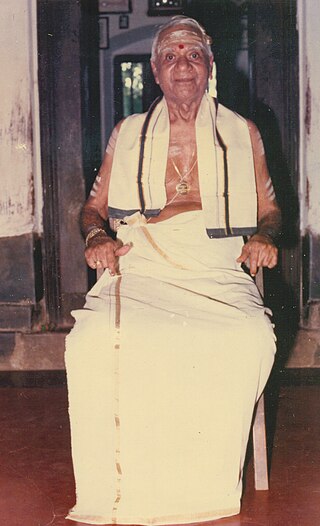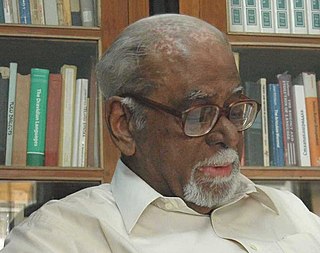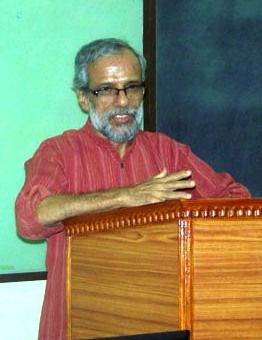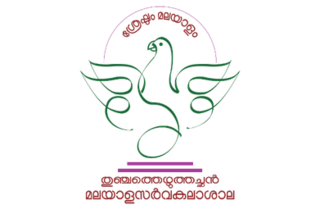
Malayalam is a Dravidian language spoken in the Indian state of Kerala and the union territories of Lakshadweep and Puducherry by the Malayali people. It is one of 22 scheduled languages of India. Malayalam was designated a "Classical Language of India" in 2013. Malayalam has official language status in Kerala, Lakshadweep and Puducherry (Mahé), and is also the primary spoken language of Lakshadweep and is spoken by 35 million people in India. Malayalam is also spoken by linguistic minorities in the neighbouring states; with a significant number of speakers in the Kodagu and Dakshina Kannada districts of Karnataka, and Kanyakumari, Coimbatore and Nilgiris district of Tamil Nadu. It is also spoken by the Malayali Diaspora worldwide, especially in the Persian Gulf countries, due to the large populations of Malayali expatriates there. They are a significant population in each city in India including Mumbai, Bengaluru, Chennai, Delhi, Kolkata, Pune etc. Malayalam is closely related to the Tamil language.

Thiruvananthapuram, commonly shortened to TVM or by its former name Trivandrum, is the capital city of the Indian state of Kerala. It is the most populous city in Kerala with a population of 957,730 as of 2011. The encompassing urban agglomeration population is around 1.68 million. Located on the west coast of India near the extreme south of the mainland, Thiruvananthapuram is a major information technology hub in Kerala and contributes 55% of the state's software exports as of 2016. Referred to by Mahatma Gandhi as the "Evergreen city of India", the city is characterised by its undulating terrain of low coastal hills.

Malayalam, the lingua franca of the Indian state of Kerala and the union territories of Lakshadweep and Puduchery, is one of the six classical languages of India. Malayalam literature comprises those literary texts written in Malayalam, a South-Dravidian language spoken in the Indian state of Kerala. The first travelogue in any Indian language is the Malayalam Varthamanappusthakam, written by Paremmakkal Thoma Kathanar in 1785. Malayalam literature has been presented with 6 Jnanapith awards, the second-most for any Dravidian language and the third-highest for any Indian language.

Guru Mani Madhava Chakyar (15 February 1899 – 14 January 1990) was a celebrated master performance artist and Sanskrit scholar from Kerala, India, considered to be the greatest Chakyar Koothu and Koodiyattam artist and authority of modern times. He was considered as the authority of Abhinaya and Nātyaśāstra.

The culture of Kerala has developed over the past millennia, influences from other parts of India and abroad. It is defined by its antiquity and the organic continuity sustained by the Malayali people. Modern Kerala society took shape owing to migrations from different parts of India and abroad throughout Classical Antiquity.

Ulloor S. Parameswara Iyer, born Sambasivan but popularly known as Ulloor, was an Indian poet of Malayalam literature and a historian. He was one of the modern triumvirate poets of Kerala in the first half of the 20th century, along with Kumaran Asan and Vallathol Narayana Menon. Umakeralam, a mahakavya, and Kerala Sahitya Charitram, a comprehensive history of the Malayalam language are two of his most important works.

Arabi Malayalam is the traditional Dravidian language of the Mappila Muslim community. It is spoken by several thousand people, predominantly in the Malabar Coast of Kerala state, southern India. The form can be classified as a regional dialect in northern Kerala, or as a class or occupational dialect of the Mappila community. It can also be called a vernacular in general, or as a provincial patois, with the latter label being increasingly applicable in Colonial times. All the forms of the Malayalam language, including Mappila, are mutually intelligible.
Arabi Malayalam script, also known as Ponnani script, is a writing system — a variant form of the Arabic script with special orthographic features — for writing Arabi Malayalam, a Dravidian language in southern India. Though the script originated and developed in Kerala, today it is predominantly used in Malaysia and Singapore by the migrant Muslim community.

Bhadriraju Krishnamurti was an Indian linguist, specialized in Dravidian languages. He was born in Ongole in Madras Presidency of British India, now currently in Andhra Pradesh, India. He was the vice-chancellor of University of Hyderabad from 1986 to 1993, and founded the Department of Linguistics at Osmania University, where he served as a professor from 1962 to 1986. His magnum opus, The Dravidian Languages, is considered a landmark volume in the study of Dravidian linguistics.

The Dravidian peoples are an ethnolinguistic supraethnicity composed of many distinct ethnolinguistic groups native to South Asia. They speak the Dravidian languages, which have a combined total of about 250 million native speakers. Dravidians form the majority of the population of South India and Northern Sri Lanka.

Kudiyirikkal Narayanan Ezhuthachan was an Indian writer and scholar of Malayalam literature. He was one among the principal followers of the idea of social impact on literature. Ezhuthachan supported Marxist literary criticism and interpreted Indian literary works based on Marxist aesthetics. He won the Sahitya Akademi Award for his work Keralodayam, a long narrative poem written in Sanskrit. He is the first Malayali to win Sahitya Akademi Award in Sanskrit. He died on 28 October 1981 while delivering a lecture at Calicut University.

Rajan Gurukkal is a leading Indian social scientist, historian, professor and writer. He has written many books and articles on different topics. He has also received awards for his works.
Sarvavijnanakosam, known in English as the Malayalam Encyclopaedia, is a general encyclopedia in the Malayalam language. It is intended to be "a compendium of world knowledge", covering over 32,000 topics. The first volume was published in 1972, and in 2015 sixteenth volume was published. In total 20 volumes are expected to be published. It is published by the State Institute of Encyclopaedic Publications. The encyclopedia received a national award for best reference book in 1979, and volume 12 received the Dravidian Linguists' Association award for best educational book of 2003.

Canarese Konkani are a set of dialects spoken by minority Konkani people of the Canara sub-region of Karnataka, and also in Kassergode of Kerala that was part of South Canara.

V. R. Prabodhachandran Nayar, popularly known as VRP Nayar, is a Phonetics expert of Kerala. He is the pioneer in the study of the phonology of the Malayalam language. Apart from phonology, he is also interested in syntax and stylistics.

Thunchath Ezhuthachan Malayalam University, also called Malayalam University, is a state university in Tirur, Kerala, India.

Karattuparambil Achuthan Jayaseelan is an Indian linguist, essayist and a poet of Malayalam literature. He is known for his poems characterized by philosophical thoughts and his contributions to the linguistics of South Indian languages.

G. Balasubramanian served as the Vice-Chancellor of Tamil University, Thanjavur, in Tamil Nadu, India, from 4 October 2018 to 3 October 2021.

Dreaming of Words is a 2021 Indian documentary film directed and produced by Nandan. Dreaming of Words has received numerous accolades including National Film Award for Best Educational/Motivational/Instructional Film (2020) awarded to Nandan as both director and producer at the 68th National Film Awards. The documentary traces the life and work of Njattyela Sreedharan, a fourth standard drop-out, who compiles a dictionary connecting four major Dravidian languages.
T Madhava Menon is a former civil servant in the Indian Administrative Service who has held various posts including that of District Collector, Palakkad, Director of Administration, Central PWD, New Delhi, Custodian, Vested (Nationalised) Forests, Kerala, Director of Tribal Welfare, Kerala and Vice-Chancellor, Kerala Agricultural University. After retirement, he was associated with the People of India Project and was the Co-Editor of the volumes related to Kerala. He is a Senior Fellow of International School of Dravidian Linguistics where he edited a three volume Encyclopaedia on Dravidian Tribes. He also edited a two-volume Handbook of Kerala. He is also a member of the Governing Council of Attappady Hill Areas Development Society.

















